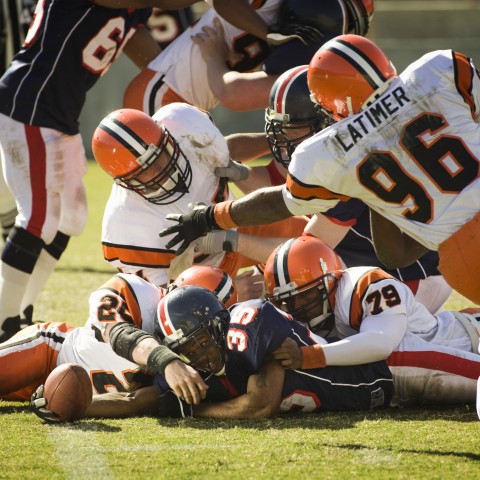
Huge, cheering (and jeering) crowds. Coffee tables and countertops laden with dozens of deliciously fatty, greasy foods. Several cases of beer located in key positions throughout the household. People dressed in football jerseys and wearing paint on their faces…
Can you believe that all of this is for a single sports game? And it happens every year.
In this article, you’ll learn about Super Bowl Sunday in the United States, from its origin to modern-day traditions. Enjoy!

1. What is the Super Bowl?

Super Bowl Sunday is one of the most-awaited days of the year for fans of American football. On this day, the football season culminates in the championship playoffs, when the two best teams from the NFL’s two conferences compete. Hardcore fans are willing to pay big for tickets to see the game in-person at the stadium, and each moment of the game is televised for the general U.S. population to watch. The Super Bowl is the most-viewed televised event in the country, and it also airs in many other countries.
One thing that keeps the game so popular among fans and the general population alike is its unique elimination system. Leading up to the Super Bowl, there are fourteen teams who compete for their chance to take part in the Big Game. Rather than playing a double-elimination series of games, a team drops out after losing one game—this makes the Super Bowl and the games leading up to it very high-stakes and far more exciting to watch.
In order to understand the significance of the Super Bowl in the United States, we need to go back a few decades…
Super Bowl History

In 1920, the most famous football league in the country was formed: the National Football League (NFL). For many years, it enjoyed quite a bit of fame and fortune as the only major football league in the U.S. But in 1960, the NFL had to face a new challenger: the American Football League (AFL), which grew to be so popular that the two leagues ended up battling for viewers.
The following year, the AFL invited the NFL to play in a World Playoff game where the winning team from each league would play each other. The idea was initially declined, but came to fruition a few years later in 1967 to reflect a merger of the two leagues (today called the NFL, which is composed of two conferences).
From that point on, the Super Bowl continued to grow in popularity. Today, it’s one of the most widely celebrated events each year.
- → Of course, not everyone is crazy about football. See our vocabulary lists on Olympic Sports and the Top 10 Summer Sports, and let us know which sports are your favorite!
2. When is the Super Bowl Each Year?
Every year, Super Bowl Sunday takes place on the first Sunday in February. Here’s a quick list of this event’s date for the next ten years.
- 2021: February 7
- 2022: February 6
- 2023: February 5
- 2024: February 4
- 2025: February 2
- 2026: February 1
- 2027: February 7
- 2028: February 6
- 2029: February 4
- 2030: February 3
3. Super Bowl Sunday Traditions

Super Bowl Sunday has become a massive tradition in the United States!
Super Bowl festivities involve gathering with family, friends, and sometimes other members of the community to watch the championship game. People may invite family and friends into their home to watch the game, though bars, restaurants, community centers, and even churches tend to be packed and loud on this day!
There are many types of people you’ll find at a Super Bowl party. No matter where you are, the true football fans will be clustered around the television (or televisions), cheering for their favorite team—and probably yelling insults at the other team when they score. In more laid-back settings, you might find people sitting around a table playing card games or talking, and still others constantly going to and from the kitchen to load their plates with more food. And, of course, you’ll find a few people who are just there for the free beer. Depending on the size of the get-together, there may be other activities going on in the background: horseshoe tournaments, chili cookoffs, foosball matches, cornhole games, and the list goes on.
A fun aspect of watching the game is the Super Bowl halftime show. During the halftime show, famous singers or bands do a major live performance in front of the live audience. This is a way of getting more people to watch the game, and it makes the experience more exciting. In 2020, the two main performers were Shakira and Jennifer Lopez; in 2021, The Weeknd will be performing.
Finally, many people tune in to watch the game just to see the famous Super Bowl commercials. Because so many people are watching the game on this day, many companies spend lots of money making their best commercials of the year to show during the game. These commercials are known for their overall high quality and for being unique, funny, or emotional.
4. Typical Super Bowl Snacks

Do you know what Thanksgiving and Super Bowl Sunday have in common? People eat tons of food on both of these days! In fact, Thanksgiving is the only day on which people eat more than they do on Super Bowl Sunday.
Some of the most common foods include buffalo wings, pizza, hot dogs, nachos, chips & dip, charcuterie-style foods (cold meats and cheeses), chili, casseroles, sandwiches, burgers, all kinds of snack foods, and a variety of sweets such as cookies and brownies.
People are also known to drink a lot of alcohol on this day, with beer being the most popular beverage.
- → Let’s be honest; most Super Bowl foods aren’t very good for you. How many of the foods above can you find on our list of the Top 10 Foods That Will Kill You Faster?
- → While you’re at it, you can also learn the names of other popular U.S. Drinks.
5. Vocabulary You Should Know for the Big Game

There is a lot of terminology related to the game of American football. Here’s a quick list of words and phrases you should know before watching.
- Stadium [n]
- This is an enclosed outdoor area with green turf (or grass) where the game is played.
- Football [n]
- This refers to American football, which differs from ‘football’ in other countries (which we call ‘soccer’).
- Touchdown [n]
- A touchdown is when a player from one of the teams gets the football to the end zone on the other team’s side of the field.
- Defense [n]
- A team playing defense tries to keep the other team from scoring.
- Championship [n]
- A championship game is a game played between two winning teams to decide who the ultimate winner is that year.
- Offense [n]
- A team playing offense tries to get past the other team’s defense in order to score.
- Line of scrimmage [n]
- This is the place on the field where the football gets hiked at the beginning of each play.
- Score [n]
- The score is how many points each team has.
- Kickoff return [p]
- A kickoff return is when a certain member of the defensive team catches the ball kicked by the offensive team and runs it toward the end zone.
- Interception [n]
- An interception is when a member of the offensive team throws the football toward a teammate, and a member of the opposite team catches it.
- Super Bowl halftime show [p]
- The Super Bowl halftime show is when a very famous singer or band performs at the game’s halfway point.
- Recover a fumble [p]
- To recover a fumble means to regain control of the football after it has been lost by a member of either team.
- Tackle [n]
- A tackle refers to a move in football where a member of one team physically hinders the member on the other team who has control of the ball.
- Playoffs [n]
- For the NFL playoffs, each of the two conferences has its best seven teams compete in a single-elimination format. The two best teams then compete in the Super Bowl.
- Special teams [n]
- Special teams are players on each team who are neither offensive nor defensive, and who are only on the field for kicking plays. There are kicking teams, punting teams, and long-snappers.
- Quarterback [n]
- The quarterback is the leading player of the offensive team, responsible for the majority of forward passes and for calling the play.
- Receiver [n]
- The receiver (also called the wide receiver) is the player on the team who is typically responsible for catching passes or blocking.
- Linebacker [n]
- Linebackers are defensive players positioned behind the line of scrimmage and behind the defensive linemen.
- Running back [n]
- The running back is an offensive position most often responsible for receiving handoffs, as well as for blocking and acting as a receiver.
- Field goal [n]
- A field goal is when the football is kicked by the player in possession of it and goes through the goal.
- Forward pass [n]
- A forward pass refers to when one player passes the ball to another player on their team who is closer to the goal.
- Pass interference [n]
- A pass interference is a foul move that involves a player of one team physically interfering with a pass made by a member of the other team.
- Rush [n]
- In offense, a rush is when the player with the football runs toward the goal without making a pass. In defense, a rush is when a player on the defensive team runs to stop the rushing offensive player.
- Get Ready for the Super Bowl! [s]
- This is a generic phrase used to make people more excited for the upcoming Super Bowl game, usually on game day.
Don’t worry if some of these terms are confusing to you. There are many people in the U.S. who aren’t familiar with them either! You can hear the pronunciation of each word and phrase on our Get Ready for the Super Bowl! word list.
Final Thoughts
We hope you enjoyed our article on Super Bowl Sunday in the United States and that you gained some new insight into American culture. Do you watch the Super Bowl game in your country? Or maybe you prefer a different league or sport? We would love to hear from you in the comments!
If you’re interested in learning even more about American culture and holidays, we highly recommend the following pages on EnglishClass101.com:
- How to Celebrate St. Patrick’s Day in the United States
- How to Celebrate Star Wars Day: May the Fourth Be With You
- The Fourth of July: Independence Day in the United States
- Learn English with the Best Netflix Series & Movies!
- How to Read Body Language in the United States
In addition to culture- and lifestyle-based materials, we provide detailed English lessons that are designed to be both fun and effective. Fine-tune your English reading, writing, and speaking skills with our numerous pathways and vocabulary lists, and check back frequently for new blog posts on key English topics. You’ll be speaking native-level English before you know it.
Happy learning from the EnglishClass101.com team!










